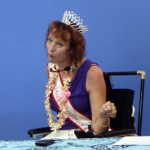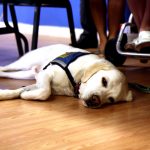KAILUA-KONA — Dr. Alette Coble-Temple rolled up to the speakers’ table Friday at the Workforce Empowerment Breakfast at the Kailua-Kona VFW Post and got straight to the point.
“I’m going to be blunt and politically incorrect here,” she said. “When we hear disability it automatically invokes fear.”
Coble-Temple, a clinical psychologist in California, is Ms. Wheelchair America 2016 and was in town encouraging employers to hire people with disabilities during the event attended by several dozen people, including business people, advocates and others.
“When you hire someone who has successfully navigated their disability, they come to you with the experience of problem-solving,” Coble-Temple said.
She says that from experience. While performing her residency, she ran into repeated questions about her ability to interact with patients and staff, despite her excellent grades.
“I don’t consider it a speech impediment, I call it a cerebral palsy accent,” she said.
According to the U.S. Department of Labor’s most recent labor force characteristic report for people with disabilities issued in June of 2015, people with disabilities had a higher rate of unemployment than those without, regardless of education. Disabled people had an unemployment rate of 12.5 percent in 2014, versus 5.9 percent for those without a disability. Changing those statistics to include disabled people in the workforce can start at the hiring process.
“(Employers) should be asking every employee what can we, as an employer, do for you to be successful in your job,” she said. That will help everyone’s productivity, she said, and reduce concerns about determining what accommodations are necessary. Coble-Temple struggled to learn that as a young adult.
Although claiming she was receiving sufficient support at work, the reality was she was not eating, drinking or using the bathroom for eight hours.
That changed as she matured. When she began her assistant professorship at John F. Kennedy University in California, her employer added five hours of a personal assistant a week. That’s beyond what the law requires.
“They did it because my productivity went through the roof,” she said.
Another powerful option is telecommuting, said Pauline Aughe, a disability advocate who was born without arms or legs.
In the modern world, employees can be effective while never appearing in the office, she said. Working in Hollywood from Kailua-Kona is entirely possible, she said, relying on video calls and distance work.
“As people who are disabled, we’re not offended by being asked how we will do the job, it’s by not asking,” she said.
Several organizations on the island, including Full Life and the Arc of Kona, provide services to connect employees and employers. The state also provides vocational rehabilitation services to community members who experience barriers to employment because of a physical or cognitive disability.
Aughe suggested contacting those agencies with available positions creates another avenue for hiring skilled employees.









